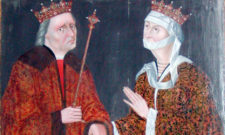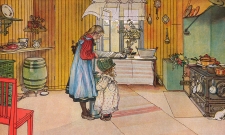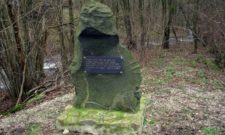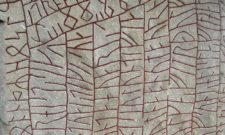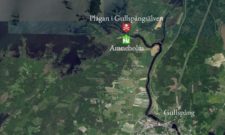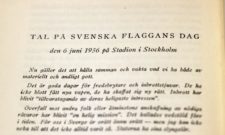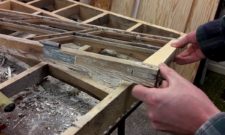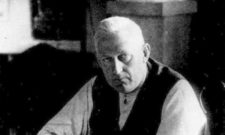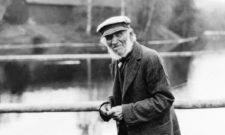Shop our historical maps
Culture
Podd: What I have sown, you shall reap tomorrow

Mar
Share on FacebookShare on WhatsAppShare on TelegramShare on X (Twitter)Listen to ”Vad jag har sått, skall du i morgon skörda” on Spreaker. Nytt avsnitt ute där poddar finns! Högläsning av Karin Boyes korta dikt “Till en okänd efterkommande” från 1922, plus eftersnack om “Sverige är ett rikt […]
Listen to "What I have sown, you shall reap tomorrow" on Spreaker.
New episode out where podcasts are! Reading of Karin Boyes short poem "To an unknown descendant" from 1922, plus an afterword about "Sweden is a rich country", about the property rights of the commoners, and about the forest.
Nice listening!
For those who prefer text:
I broke my bread, which the hand of others had baked,
and drank my wine, which I did not prepare myself.
Those who have labored never tasted
its fruit, before they entered the dark ways.What I have sown, you shall reap tomorrow.
O may my seed bear a hundredfold!
They bear joy, who bear the burden of others,
they cut off life, as others' crops cut off.
This was the poem "To an unknown descendant" by Karin Boye, from her poetry collection Clouds, which she debuted with in 1922.
My name is Daniel Sjöberg, and you listen to the lyrics segment of the podcast Allmogen, where the focus is on old classic Swedish poems and songs - which can still contribute to reflection and insight into life's big questions. For beauty is eternal, and lyricism is beauty in the form of words.
Karin Boye lived between 1900 and 1941. Only 40 years old, she died after an overdose of sleeping pills. She is said to have been found lifeless by a large stone on a hill in Nolby north of Alingsås, where a memorial stone stands today. Karin was best known for her poetry, but also wrote several novels and short stories, one of the most famous being the dystopian science fiction novel Kallocain.
Kallocain describes a future society in which the individual belongs to the state, has significance only as part of the group and is under constant surveillance. The novel describes how deep human emotions such as love and the quest for freedom take hold despite the constant surveillance and the closed society.
But back to the poem.
What I have sown, you shall reap tomorrow.
[...] They cut lives, as others' crops cut.
You've probably heard it too, that "Sweden is a rich country". That Sweden "can afford it".
That's how it usually sounds when some politician or opinion leader wants to spend taxpayers' money on various things that are most likely not so much in the interest of the citizens but more in the personal interest of the opinion leader.
How does this wealth fit in with the fact that the Swedish people today are one of the most privately indebted populations on earth?
"He who is in debt is not free", or what was it?
But something else these people don't talk about is how Sweden became a rich country.
"In this country, from the very beginning, we have not been given anything to give." said Vilhelm Moberg in a speech in Norrtälje on October 12, 1947, which was titled "On the basis of freedom" in the book In the name of truth and fantasy - Vilhelm Moberg the speaker (2011).
Vilhelm Moberg called the story of those who built Sweden from the ground up a "heroic epic", in a speech on Swedish Flag Day in Gävle on 6 June 1944. He tells how foreigners travelling through Sweden long ago always showed great surprise at how poor and barren the country was. He tells how they complain about bad roads, miserable housing, and "frighteningly large forests". But the people, the "zealous and striving people", the "hardy, persevering people", won their admiration.
He continues in the 1947 speech:
Those who first broke the Swedish settlement were not allowed to count their working hours. The ground was stony and unstable, the summer was short and the winter long, the distances were frightening and the narrow tracks the only accessible roads, the tools were primitive. The land given to the fathers did not abound in bread, still less in milk and honey. They often had to mix the bark of trees into their bread and eat buds and heather and draff. Under endless toil and hardship the land was cultivated and made habitable.
There are millennia of history between the first sweat hoe in the forests and the tractor that today rolls across well-used Swedish fields. It is the story of how the Swedes have built up their country and made it what it is today: a prosperous country. The standard of living in Sweden before the Second World War was considered the highest average in the world.
This development has been made possible by the work of the people on the basis of freedom.
"The grey mob", they called it. The peasants in their quilted sweaters. This grey, poor crowd, that was the one that conquered Sweden for farming. "And at the same time," Moberg points out, "they were to preserve and defend their freedom, the right to life and property, which has ancient roots in this country, older than in most countries, but which was by no means elevated above threats and restrictions and attacks."
But the grey mob eventually got it right. From being one of the poorest countries in Europe well into the 19th century, the prosperity of the common people exploded in the 20th century as they unlocked the resources of Swedish nature with their ingenuity, enterprise and energy and learned to harness its primal powers.
The rivers, the ore, the forest.
"Poor Sweden began to become prosperous, especially in comparison with other countries," said Vilhelm Moberg in the same speech. He continued, "The reason for this was that Swedish freedom could be realised to an extent never before seen in the history of our country."
Even in today's Sweden, we still live in many respects on the harvest that previous generations sowed. The wealth of this country, the land we stand on, was cleared, fertilised and planted by people long dead and forgotten. Our ancestors.
In the speech in Gävle in 1944, Moberg says:
Thus our land is also the land of the dead, those who have disappeared into nameless graves around parish churches. They have broken this settlement and walled these stone farms, they have left their mark on the land. And we now living are marked by our origins. We all came from the cottages of farmers, peasants and backwoods dwellers - through longer or shorter family chains. We are of their blood, through them run our roots, which we can follow through the millennia. It is a great congregation, the congregation of our fathers there under the grass of oblivion in the graveyards. From them we got the land around us.
Torgny Segerstedt also had similar thoughts in his article The Swedish Spring published in Göteborgs Handels- och Sjöfartstidning (GHT) on 24 April 1940:
The wind shall pass over these wide districts as it has done from the day they rose from the ice sheet. It will pass over them like mild spring winds, like balmy summer breezes, like rain-whipping autumn storms, like wintry snowstorms, years and centuries after we, who now experience spring, have been enclosed in the arms of this grey earth. The churches lie there scattered across the land, with the cares of the dead gathered around walls often centuries old. Those who sleep the eternal sleep beneath these tombs, have all given their contribution to the rich heritage of the Swedish people. No honest day's work, no good thought, no creative joy, no anguished endeavour has been wasted. It is all there in the fields that have been broken, in the enterprises that have been set in motion, in the legal system that has been built, in thought, poetry and tone. Only those who fail have no share in this. The families that went before us were no better than ours, no more magnanimous, no more capable. Not only did they, in all their imperfection, create this infinitely great thing, which we in our turn must leave to our descendants, fortified by the best we in our frailty had to give.
And this land that Moberg and Segerstedt are talking about, it's largely covered by forests. The countless small villages of the old farming community were surrounded by vast, desolate wildernesses and dark forests where the laws and rules of the capital could not penetrate.
In the old days, the great forests belonged to everyone and no one. In one of his speeches, Moberg mentions a saying that "Forests grow for the poor as well as for the rich". Our ancestors called the forest "the poor man's garden", and long before the forest became one of the Swedes' most important exports, the "grey mob" turned to the forest for food, fuel, protection from the elements, and defence against oppressors.
100 years.
That's roughly how long it takes from planting a forest until it's ready to be harvested.
So a forest that is being felled today may have been planted around 1920, or even earlier.
If we imagine that that forest had belonged to my family, it would mean that it was planted by my great-grandfather, Per-Olof, perhaps with the help of his father Johan, my great-grandfather. Then the forest was cared for by Per-Olof during its first decades. Then one day when Per-Olof could no longer cope, my grandfather, David, would have taken over. Year in and year out he cared for the forest, thinned, spent his time there, and watched his children grow up among the pines. Then came the turn of my father, Bertil, who did exactly the same thing for as many decades. Then came the turn of me, Per-Olof's great-grandson.
Then the day finally came when I stood there in the woods and would reap the results of four or even five generations of hard work. But as I stood there, chainsaw in hand, a man appeared in the woods wearing rubber boots and holding a magnifying glass at the ready, and I wondered what this person was doing on my land at the very moment I was harvesting.
"I'm from the State," she said, "and you might as well forget about this logging. Because we have found a very rare beetle in your forest and have therefore classified the forest as worthy of protection. So you won't be able to find anyone to buy the wood anyway. Unfortunately, no compensation will be paid, because if we had to compensate you, we would have to compensate all the other forest owners as well, and the State cannot afford that."
End of story.
This is the situation today with Swedish forest owners' rights to their property. The state confiscates privately owned forests, without paying for them.
Anyone who doubts that the state would do such a thing need only listen to the question posed by the state forestry investigator Charlotta Riberdahl during Almedalen Week 2016, when she said, "Should you allow such large-scale private ownership of such an important natural resource?" Now she was fired from her post immediately after the statement, but it still says a lot about the state's view of property rights.
Martin Jacobsson, who runs In the land of fables and Curious, wrote in Svenska Dagbladet 13 February this year about the state's behaviour: "requiring individual forest owners to refrain from logging on significant, perhaps entire properties - on the formal basis of the Species Protection Order - is not voluntarism, it is theft!"
"What I have sown, you shall reap tomorrow."
If you are not sure to reap what you sow, what do you think will happen to people's willingness to plant new seeds and seedlings in the soil?
If you were genuinely unsure whether you would get a paycheck at the end of the month, how excited would you be to go to work?
You need to be even more confident when the time horizon is 40, 60 or even 120 years, which some forests require to grow.
120 years, during which time there are 30 elections to Parliament. The politicians' time horizon is short, the forest owners' is very long.
As a forest owner, you plant trees whose shadow may never fall over your face. But you do it anyway, secure in the certainty and security of your ownership - knowing that your descendants will reap what you have sown.
Prosperity is not created in 4-year periods. It is created over generations. That is why it is vital that the rights of ordinary men and women to their property are defended tooth and nail.
As early as 1947, Vilhelm Moberg saw worry clouds on the horizon, which he told us about in his speech that October day in Norrtälje over 70 years ago. Swedish freedom was under threat.
But it was not autocratic kings or noble lordship that threatened. No, according to Moberg, the threat came from forces that had no individual or human traits. The threat came from what he called "the levelling forces of the collective", a "waste product of the machine age." I quote:
It is the State that has begun to develop into an end in itself and now demands the submission of the individual. State autocracy threatens.
State autocracy has always threatened individual freedom and the right to life and property. This threat did not disappear when Sweden became a democracy. If you think I'm full of shit, ask a forester.
"What I have sown, you shall reap tomorrow."
Of course, it's not just in purely economic terms that we reap what previous generations have sown.
We are also reaping the results of the political decisions taken by those in power in this country. I can say with some certainty that the power-grabbing decisions made - and not made - by the rulers of our time, just in my relatively short lifetime, will be remembered for many generations to come in Sweden. We have only seen the beginning of that harvest.
State autocracy is no longer a threat. It is here.
Vilhelm Moberg's speech, which can be found in its entirety in the book In the name of truth and imagination, concludes with these words - which may also end this section:
"Shall we go into that business?
Shall a thousand years of development under freedom be interrupted under a new autocracy?
This country is ours, and we want and intend to keep it. But we want to continue our work here on the basis of freedom."
This country is ours, but I'm not talking about some fuzzy, coercive collectivism where we own the land together. Sure, in theory we own a small part of it collectively through the state, like roads, hospitals, schools, etc., but the bulk of the country we actually own separately as individuals.
Millions of small plots of land, owned by millions of Swedes - and others living in our vast country. That's Sweden. And we want and intend to keep our land - by protecting the right to the individual's property, and to the fruits of the individual's labour.
We want to continue our work here on the basis of freedom.
There is no alternative.
Have a nice weekend, everyone.
And if you, the listener, like what you just heard, please support the project and I will be able to do a lot more in the same spirit. Projekt Allmogen stands for free and independent education about our Nordic and Swedish history, about our beautiful, indomitable culture, about our traditions and not least our heritage of freedom. The best way to support the project is to go to Allmogen.org/member and become a supporting member. Then you contribute 50 SEK a month (or more if you want), and become one of the project's one thousand true friends.
Subscribe to YouTube:
If you appreciate Allmogens independent work to portray our fine Swedish history and Nordic culture, you are welcome to buy something nice in the shop or support us with a voluntary donation. Thank you in advance!
Support Allmogens via Swish: 123 258 97 29
Support Allmogens by becoming a member
Support Allmogens in your will
